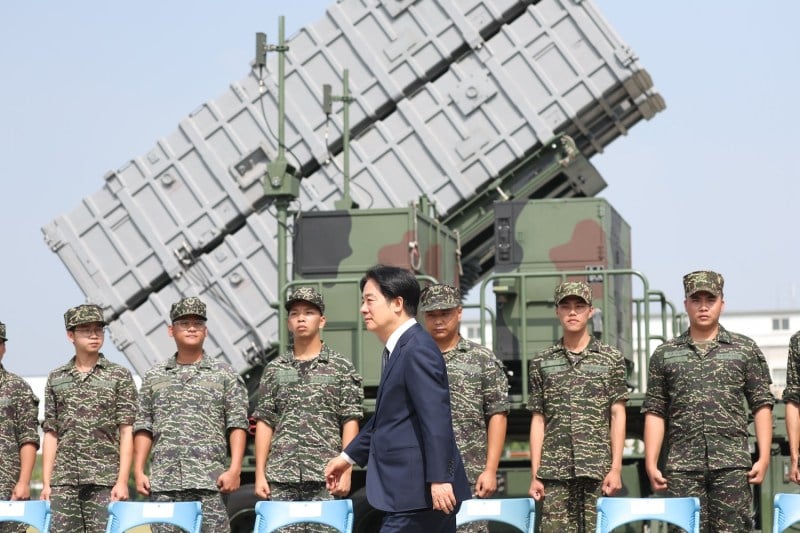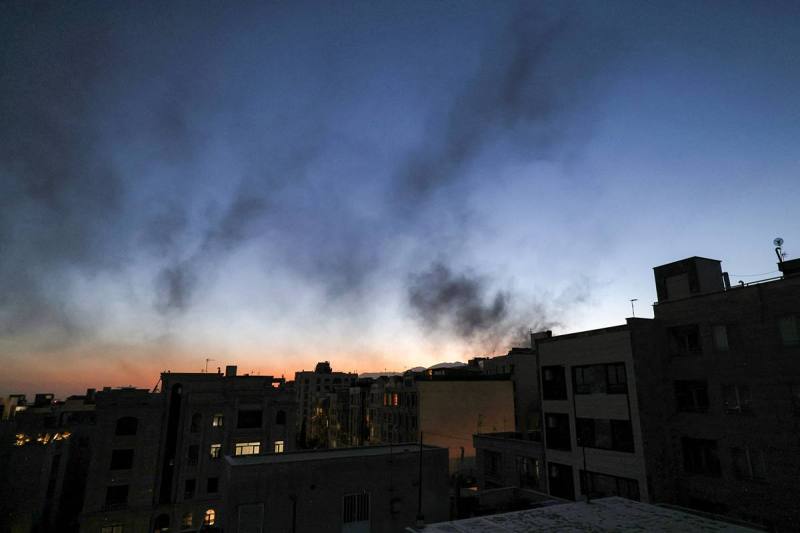Trump Should Rein In Taiwan

Trump Should Rein In Taiwan
President Lai Ching-te’s rhetoric increases the risk of war with China.
Taiwanese President Lai Ching-te walks past soldiers at a naval base in Taoyuan, Taiwan, on Oct. 18, 2024. I-Hwa Cheng/AFP via Getty Images
U.S. President George W. Bush will never be known for his restraint on the world stage, but when Taiwanese President Chen Shui-bian sought to move the island closer toward independence in 2002, Bush sent his diplomats to rein in America’s democratic partner. The president then flatly told China, and the world, that the United States opposed Chen’s plans, which would provoke Beijing, fuel escalation, and increase the risk of a war that could draw in the United States.
Today, Taiwan has another hard-charging president, Lai Ching-te. In March, Lai designated China as a “foreign hostile force,” an unprecedented step, and unveiled 17 “proactive measures” to combat Chinese infiltration on the island. Beijing followed up with large military drills simulating a blockade and strikes against Taiwan’s ports and infrastructure.
U.S. President George W. Bush will never be known for his restraint on the world stage, but when Taiwanese President Chen Shui-bian sought to move the island closer toward independence in 2002, Bush sent his diplomats to rein in America’s democratic partner. The president then flatly told China, and the world, that the United States opposed Chen’s plans, which would provoke Beijing, fuel escalation, and increase the risk of a war that could draw in the United States.
Today, Taiwan has another hard-charging president, Lai Ching-te. In March, Lai designated China as a “foreign hostile force,” an unprecedented step, and unveiled 17 “proactive measures” to combat Chinese infiltration on the island. Beijing followed up with large military drills simulating a blockade and strikes against Taiwan’s ports and infrastructure.
Washington has rightly denounced China’s military escalations, but it has so far overlooked Lai’s subtler political escalations. The Trump administration should rein in Lai before he mistakes Washington’s passivity for approval and entangles the United States in a potentially calamitous war.
Since Lai took office last May, he has continually taken new steps to protect and assert Taiwan’s status as a “sovereign, independent nation,” to quote his inaugural address. Many of his actions, such as boosting Taiwan’s defense spending to target 3 percent of GDP and implementing civil-defense training programs, are welcome and indeed overdue. These measures improve the island’s defenses and strengthen cross-strait deterrence. Yet his other moves have predictably antagonized Beijing for no benefit.
Before deeming China a foreign hostile force, Lai gave several speeches that went significantly further than his predecessors in positioning Taiwan as a sovereign state that is separate from China. Lai is not proposing that Taiwan formally declare itself independent, a move that would cross Beijing’s clearest red line and command little popular support among Taiwanese. He is, however, engaging in classic “salami-slicing” tactics that go largely unnoticed to observers around the world, except the ones that matter most: the parties staring each other down across the strait.
Lai’s actions may boost his domestic support, but they increase the risk of a war that nobody should want. According to U.S. intelligence, Chinese President Xi Jinping has told his military to become capable of seizing the island by 2027 but may not necessarily intend to order such an operation. By moving Taiwan closer toward independence, however, Lai’s moves are greatly increasing the risks that Xi will. Xi could seize Taiwan’s outlying islands, order a blockade, or even invade, reasoning that if he does not act now, China will miss the chance to bring Taiwan under its authority forever.
Some will object that because China bears blame for coercing Taiwan, it would be perverse to pressure the latter as well. But there is no plausible exit from the dangerous, escalatory trajectory of cross-strait relations unless both sides find ways to climb down. The need to strengthen Taiwan’s defense capabilities should accentuate, not diminish, the need to avoid poking Beijing through rhetoric. Lai clearly sees things differently, and only the United States has the leverage to make him change course.
Unfortunately, Washington has so far allowed Lai to fly under its radar. U.S. President Donald Trump has yet to focus on Taiwan, and his administration has encouraged Lai’s defense buildup. Lai could thus be forgiven for thinking that America has his back as he steers Taiwan toward greater independence. But this conclusion would be premature. Taipei should not overestimate what the United States, under any president, would do in its defense. Polls show that scarcely more than one-third of Americans would favor going to war for Taiwan. Taiwan must make decisions with clear eyes and not assume the United States will fight World War III on its behalf.
To deliver the right message, Trump need not repeat the ugliness of his Oval Office spat with Ukrainian President Volodymyr Zelensky. Instead, he can simply say the United States wants China and Taiwan to resume the cross-strait dialogue that existed prior to 2016. Getting there would likely require Taipei to return to its long-standing position that there still exists “one China” of some kind. This is a useful fiction that Beijing should welcome yet costs Taiwan nothing but words. To get Lai to move in this direction might require Trump to make clear to him that Washington opposes any moves by Taiwan to inch closer and closer to independence. Given the costs the United States could pay in the event of a war, this would be a reasonable request.
When Trump meets with Xi, the leaders could also discuss a public exchange of assurances over Taiwan. The United States could, for example, affirm that it would accept any peaceful resolution of cross-strait differences and would under no circumstances support Taiwan’s independence, except with the consent of both sides. In return, China could declare that it has no timeline for seizing Taiwan and pull back on its military posturing and gray-zone operations targeting the island, offering a great relief to the Taiwanese people. Such assurances would serve to restrain Lai, and even if Beijing did not live up to its commitments, countries in the region, which are crucial to Taiwan’s defense, would see that China bears sole responsibility for any further escalation.
Many in Washington will decry the idea of pressuring a U.S. partner and bargaining with a U.S. adversary. But the situation demands action. Trump should make clear that Lai must stop pushing the envelope on Taiwan’s independence in order to retain strong backing from the United States. If Bush could adopt a measured policy in the interest of preserving peace, so can Trump. The alternative is to watch the status quo continue to deteriorate, potentially to the point of no return.
Christopher S. Chivvis is a senior fellow at the Carnegie Endowment for International Peace.
Stephen Wertheim is a senior fellow in the American Statecraft Program at the Carnegie Endowment for International Peace and the author of Tomorrow, the World: The Birth of U.S. Global Supremacy. X: @stephenwertheim
More from Foreign Policy
-

A drawn illustration of a Trump whirlwind on a red background Four Explanatory Models for Trump’s Chaos
It’s clear that the second Trump administration is aiming for change—not inertia—in U.S. foreign policy.
-

Marco Rubio is seen up close, sitting on a couch beside J.D. Vance. Marco Rubio’s Soulless Crusade
The U.S. secretary of state stands for no principle other than serving the man who appointed him.
-

Soldiers from various NATO allies take part in a military exercise at the Smardan Training Area in Smardan, Romania, on Feb. 19. America Will Miss Europe’s Dependence When It’s Gone
European self-reliance for security will cost U.S. jobs, profits, and influence.
-

A collage photo illustration shows Donald Trump gesturing with arms wide. In front of him are headshots of Benjamin Netanyahu and Vlodymyr Zelensky, images of immigratns and ICE police, a tattered EU flag and America First signs. Trump’s First 100 Days on the Global Stage
Ten thinkers on what to make of the opening salvo of the president’s second term.









Join the Conversation
Commenting on this and other recent articles is just one benefit of a Foreign Policy subscription.
Already a subscriber?
.
Subscribe
Subscribe
View Comments
Join the Conversation
Join the conversation on this and other recent Foreign Policy articles when you subscribe now.
Subscribe
Subscribe
Not your account?
View Comments
Join the Conversation
Please follow our comment guidelines, stay on topic, and be civil, courteous, and respectful of others’ beliefs.
Change your username |
Log out
Change your username:
CANCEL
Confirm your username to get started.
The default username below has been generated using the first name and last initial on your FP subscriber account. Usernames may be updated at any time and must not contain inappropriate or offensive language.